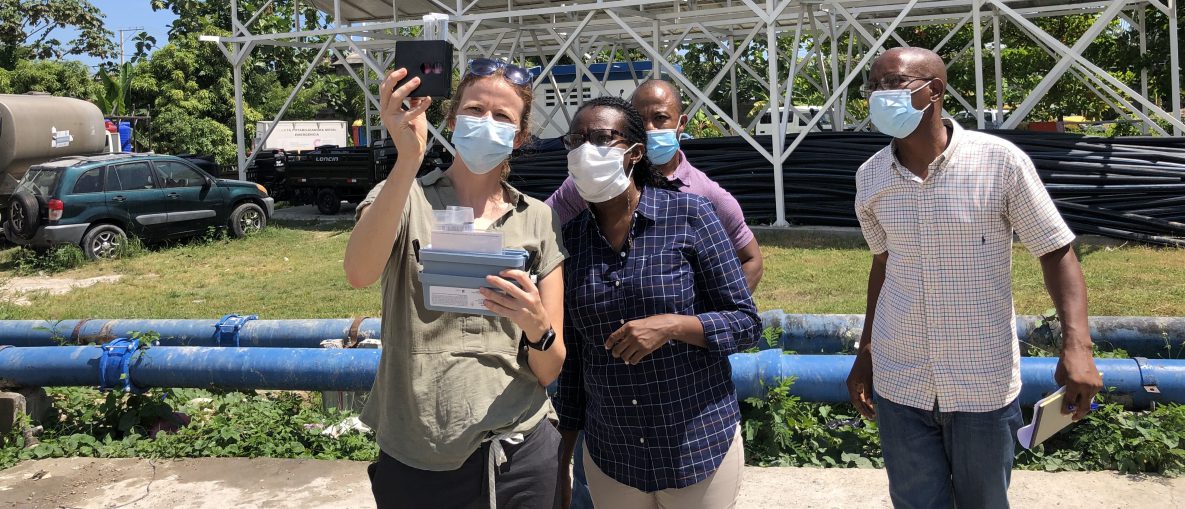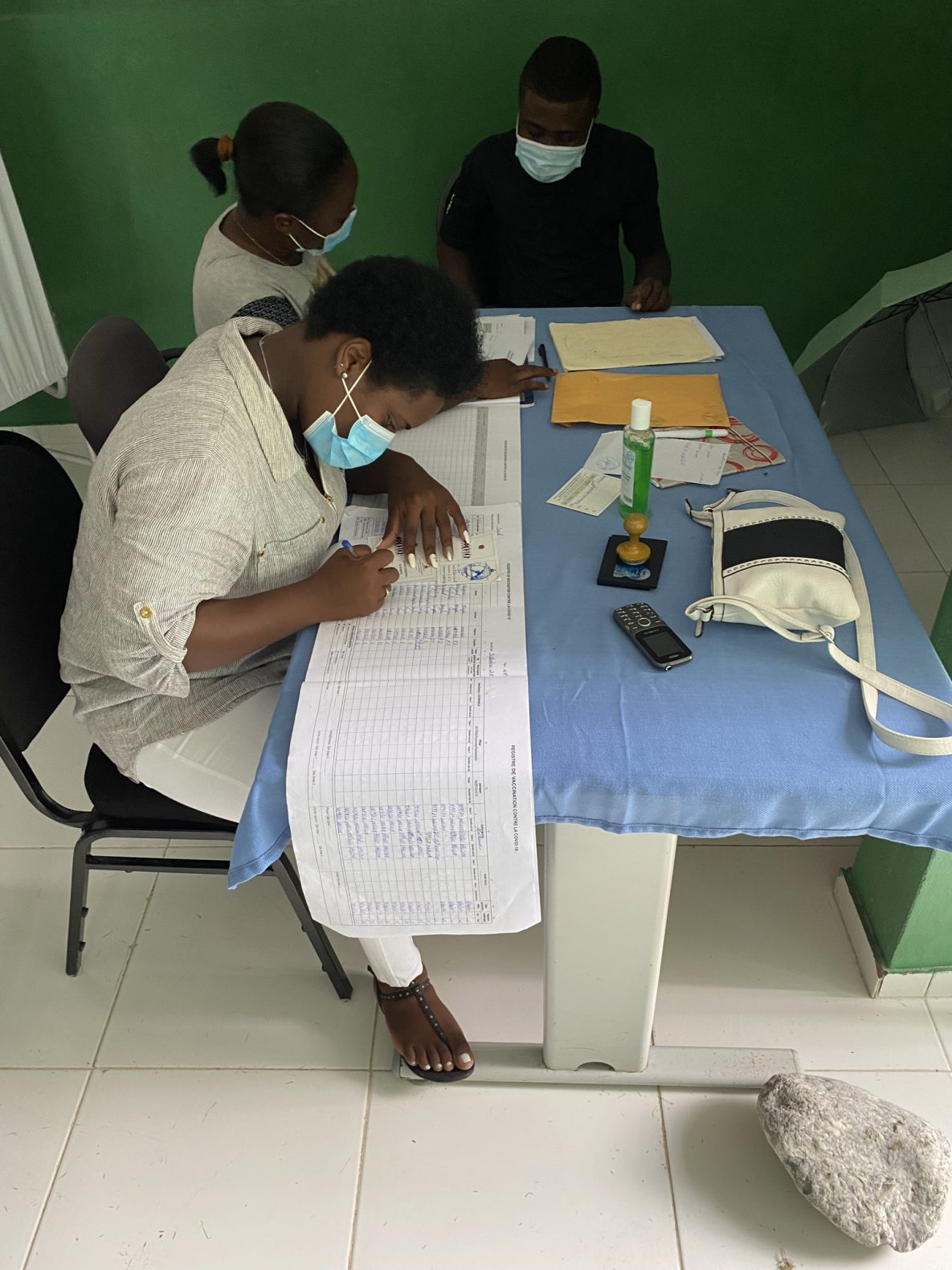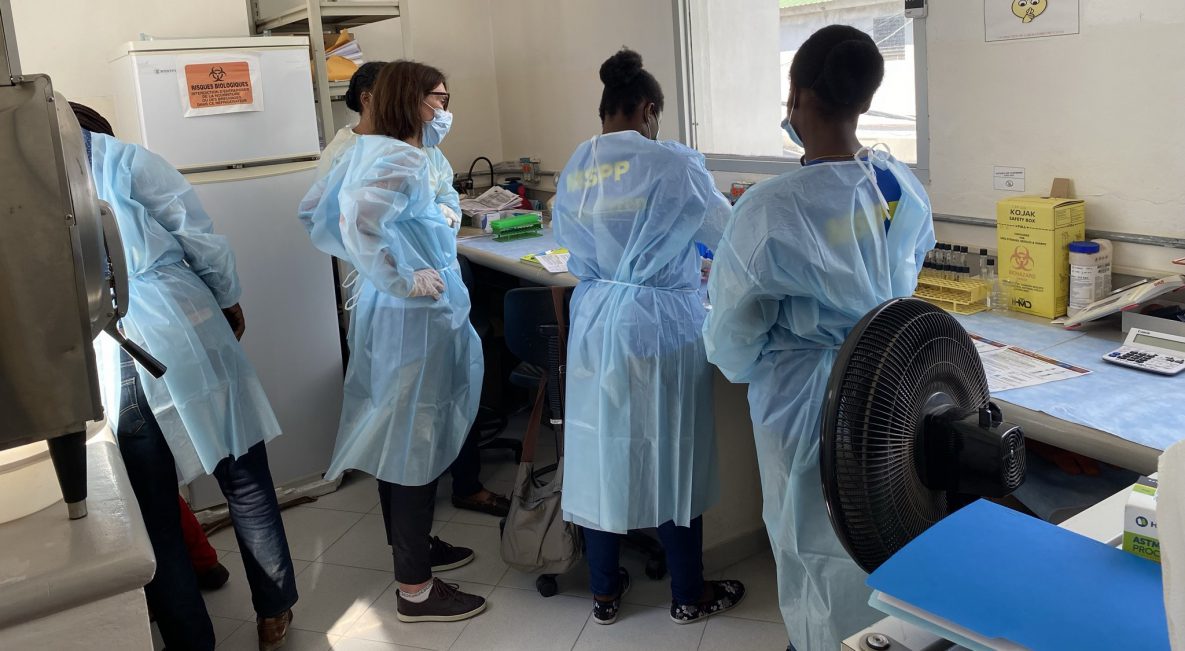CDC Experts and Partners Unite to Respond to Haiti Earthquake Amidst COVID-19 Pandemic
February 15, 2022

Andrea Martinsen (DGHP CDC Atlanta Public Health Engineer), Melissa Etheart (CDC Haiti Medical Epi), Evenel Thermidor (DINEPA CDC Project Lead), and Gabriel Tondreau (Water Quality Specialist) are testing for free chlorine residual at the DINEPA (the Haitian directorate for potable water and sanitation) truck filling station in Les Cayes, Sud Department. Photo: Amber Dismer/CDC
During the pandemic, other public health threats do not wait to strike. Disease outbreaks and natural disasters may overlap, disrupting the public health system, devastating economies, and threatening the social fabric of communities. On August 14, 2021, a 7.2 magnitude earthquake struck Haiti’s southwestern region, killing more than 2,240, injuring approximately 12,700, and threatening the country’s health security. CDC immediately activated an Incident Management System (IMS)— a temporary, formal organization structure to coordinate an emergency response — and recruited experts from across the agency to respond to the earthquake. By leveraging existing President’s Emergency Plan for AIDS Relief (PEPFAR) agreements alongside global health security (GHS) investments, CDC collaborated with in-country partners, the Ministry of Public Health and Population (MSPP), the Haitian directorate for potable water and sanitation (DINEPA), and the National Public Health Laboratory (LNSP). Together, they quickly responded to lead the earthquake response without neglecting other public health priorities in Haiti, such as COVID-19 and waterborne diseases.
CDC efforts to build Haiti’s public health infrastructure began years ago. In response to the 2010 Haiti earthquake, which resulted in 800,000 confirmed cholera cases and 9,700 lives lost, CDC has invested in expanding existing partnerships with the government of Haiti to strengthen the country’s public health infrastructure. These partnerships contributed to a rapid response to the August 2021 earthquake. The 2021 earthquake displaced more than 38,000 from their homes and damaged or destroyed approximately 90 health centers in southwestern Haiti. Experts from CDC worked with Haitian health organizations to provide skills and expertise in various response areas including in water, sanitation, and hygiene (WASH), vaccine uptake, surveillance and laboratory, security, and more.
The collaboration of multiple internal and external partners enabled the response to accomplish a broad range of activities, including
- Ensuring laboratory and epidemiologic surveillance capacity was restored to monitor for waterborne diseases given damage to water infrastructure, flooding, and crowding among displaced persons
- Supporting a scale-up of vaccination against COVID-19 by providing additional vaccines to the affected departments or geographic areas of the country and by supporting new vaccination sites and access points (mobile clinics)
- Rehabilitating water and sanitation infrastructure and supporting hygiene promotion in health facilities and assembly points serving displaced persons
- Providing technical expertise to minimize the impact of COVID-19 in the context of border health and community transmission
- Providing technical expertise and support for rapid detection of COVID-19 cases and tracing of contacts
- Developing infection prevention and control (IPC) measures and updating standard operation procedures (SOP) for healthcare facilities
“The cross-agency engagement and strong local partnerships during this response were key to our success,” said Lieutenant John Rossow from CDC’s Global Rapid Response Team (GRRT). “This response highlighted the importance of engaging subject matter experts across the agency in their respective fields, particularly during complex emergency response when a variety of infectious diseases and other health concerns are present.”

Ministry of Public Health and Population (MSPP) COVID-19 vaccination site funded by CDC in Les Cayes, Haiti on October 21, 2021. Photo: Chung H. (Ken) Chen/CDC
As a result of post-earthquake flooding and damaged water treatment infrastructure, addressing potential waterborne illness was a high priority. Field Epidemiology Training Program (FETP) fellows were immediately deployed to earthquake-affected areas to conduct rapid needs assessments, which provided more detailed information on the extent of the damage and priority needs by department; these data helped inform decisions about which response activities to prioritize. Following the earthquake, CDC staff at headquarters in Atlanta provided support to prevent a possible outbreak of waterborne illness. Using the Epidemic Intelligence from Open Sources (EIOS) system, CDC staff conducted media scans across social media, online news (including local media), and official press releases to detect signs of emerging waterborne outbreaks.
“Surveillance, particularly event-based surveillance (EBS), can help identify the first signs that something new is emerging. Often the first signals of a new outbreak or event are reported in media before they appear in official sources”, explains Larry Hinkle, CDC Global Disease Detection Operating Center (GDDOC) epidemiologist.
Potential outbreaks of waterborne disease were a significant concern due to the country’s limited access to WASH services, previous history of cholera, and significant damage to WASH infrastructure from the 2021 earthquake. Fortunately, no confirmed cases of cholera have been detected since February 2019.
To support the 2021 earthquake response, CDC leveraged investments in existing laboratory, surveillance, and water and sanitation infrastructure that were established after the 2010 earthquake. CDC experts and the CDC Haiti Country Office worked with the MSPP and LNSP to strengthen laboratory systems to support cholera surveillance by training local nurses to roll out cholera rapid diagnostic testing (RDT) in assembly points. Additionally, CDC coordinated with the MSPP and LNSP to ensure integrated reporting with existing national systems. This collaboration strengthened surveillance of both waterborne diseases and COVID-19 cases in the earthquake affected areas. CDC also worked with Haiti’s Directorate for Potable Water and Sanitation (DINEPA) to scale up monitoring of free chlorine residual in municipal water systems, water trucking filling stations, and other sites to ensure the population had access to treated water. In response to the earthquake, CDC is supporting DINEPA and UNICEF on rehabilitation of WASH infrastructure in communities, health institutions, and schools.
Prior to the 2021 earthquake, there was limited communication about COVID-19 vaccines and 10 administering sites in Haiti. This limited communication contributed to low vaccine demand across the country. Vaccination activities were interrupted when five of the 10 vaccination sites were destroyed in the earthquake.

To prevent transmission in displaced populations, CDC and in-country partners worked diligently to scale up vaccination opportunities in earthquake-affected areas. With support provided by CDC through the CDC Foundation and implementing partners, a total of 154 vaccination sites have been supporting vaccination, including 13 of 16 total in the earthquake-affected areas. Given limited vaccine supplies, coupled with low vaccine demand, less than 3,000 vaccine doses were administered in earthquake-affected areas prior to the earthquake. Following the earthquake, CDC partners began work to increase access and vaccination outreach. Various outreach activities including increased radio and television broadcasts, vaccination sites, meetings with community members and health workers, mass vaccination events, and flyers aimed to increase demand for vaccines. One week after CDC support was scaled up, 3,000 additional people were vaccinated through partner funding.

Training in Rapid Diagnostic Testing (RDT) for cholera in Les Cayes, Sud Department on October 21, 2021 with Ministry of Public Health and Population (MSPP) nurses and laboratory technicians. Photo: Chung H. (Ken) Chen/CDC
The successful response to the 2021 Haiti earthquake was built on decades of work led by the CDC Haiti Country Office to help build the capacity of the government of Haiti and its partners to rapidly respond to natural disasters frequently experienced in the country. This collaboration helped to strengthen surveillance and reporting of both waterborne diseases and COVID-19 cases, implement the use of rapid diagnostic tests for cholera in assembly points of displaced persons, and restore and accelerate COVID-19 vaccination rates to pre-earthquake levels in earthquake-affected areas within days. Each partner contributed unique skills and experiences to respond to this natural disaster while continuing to support ongoing public health priorities. CDC has worked to ensure emergency response investments strengthen Haiti’s national labs and surveillance networks and help build resilience.
During her deployment to Haiti from October 4-24, 2021, Christine Dubray, CDC GRRT member speaks with pride about resilience during Haiti’s public health crises and notes, “The resilience of our Haitian CDC colleagues, responding to multiple public health emergencies, and at the same time juggling with stressful ongoing insecurity affecting them and their families, is inspiring and needs to be recognized every day.”